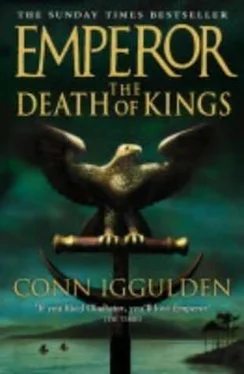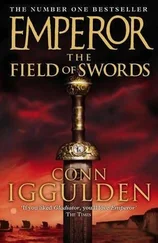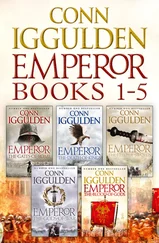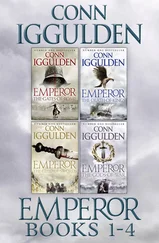“Good lads,” he said when he was sure they were helpless. “It's only because I am a dangerous old sod that I carried one myself. Will you be fighting tomorrow?”
Julius nodded, unable to believe what was happening. His mind raced, but there was nothing to be done. When he realized that, he finally relaxed and laughed, making Brutus jump. The man with the dagger returned it, chuckling softly as he looked at the young Roman.
“You might as well laugh, lad. This is a tight space for a bit of a struggle. Do what you came for; it won't make any difference. There won't be much stopping us tomorrow, no matter what you report back.”
Watching the man for sudden movement, Julius sat down, his heart hammering at the thought of one quick push sending him over the edge. The situation was strange to say the least, but the man with the knife seemed to be enjoying it. Whoever he was, he seemed completely relaxed, removed from the struggle they would all face back on the ground.
From the top of the granite spike, the rebel camp seemed incredibly close, almost as if a good leap would have them land in the center of it. Julius looked it over and wondered if they would be allowed to return before the watch centurion reported them missing.
The man with the knife put it away in his tunic and sat next to Julius, following his gaze. “Biggest army I ever saw,” he said cheerfully, motioning toward the rebel camp. “Tomorrow will be hard on you, I should think.”
Julius said nothing, unwilling to be drawn. Privately, he had the same impression. The enemy camp was almost too large to take in and looked as if it could swallow the eight legions without trouble.
Brutus and the wrestler had remained standing, keeping a close eye on each other's movements. The man with the knife grinned at the pair of them.
“Sit down, you two,” he said, gesturing with a flick of his head. Reluctantly, they edged together and sat close, as tense as wires.
“You must have what, thirty, forty thousand men?” the wrestler asked Brutus.
“Keep guessing,” Brutus replied curtly and the man began to rise, held down with the lightest touch from his companion.
“What does it matter now? We'll send the Romans running, no matter how many they have.” He grinned at Julius, clearly hoping he would rise to the barb.
Julius ignored him, busy memorizing the few details of the camp he could make out in the dim light. He noted the moon had sunk lower and stood slowly so as not to alarm his strange companions.
“We should be going back now,” he said. The tension returned to him then, tightening his sore muscles.
“Yes, I suppose we all should,” the man with the knife replied, rising smoothly to his feet. He was easily the tallest of all of them and moved with an efficiency of motion that marked a warrior. Brutus had it and perhaps it was that unconscious recognition that had raised the hackles of the one with a wrestler's build.
“This has been… interesting. I hope you and I don't meet tomorrow,” Julius said.
“I hope we meet,” Brutus added to the wrestler, who snorted in disdain.
The man with the knife stretched his back and winced. Then he clapped Julius on the shoulder and smiled.
“In the hands of the gods, lads. Now, I think my friend and I should climb down first, don't you? I don't really want you thinking better of our little soldier's truce when you have your swords again. Get right over where you climbed up and we'll be away in no time.”
The two older men scrambled from sight with casual agility and were gone.
Brutus let out an explosion of breath. “I thought we were dead.”
“So did I. Do you think that was Spartacus?”
“Possibly. When I tell the story, it certainly will be.” Brutus began to laugh simply to release the awful tension of the meeting.
“We'd better move, or that guard will serve us up to Pompey on a platter,” Julius said, ignoring him. They climbed down quickly and bore the scrapes and bruises of the descent without a sound. Their sandals were where they had left them, but the two swords had been taken. Brutus looked for the weapons in the bushes, but came back empty-handed.
“Bastards. There's just no honor anymore.”
The legions broke camp and formed the battle line two hours before dawn. As soon as it was light enough to see, the cornicens sounded their wailing notes and the huge squares of legionaries moved forward, shrugging off the stiffness and cramp of the morning as they marched. There was no idle chatter in the ranks with the army of Spartacus filling the plain and seeming to stretch to the horizon. Even the crash of their sandals was muffled in the turf, and each man loosened his shoulders as he came closer and closer to the moment when the silence would rupture into chaos.
All along the legion lines, the heavy onagers and catapults were heaved into position. At colossal range, stones, iron balls, and arrows the weight of three men could be sent smashing into the enemy. The men around them cheered as the heavy horse-hair springs were winched back into firing position.
Julius marched with Brutus and Ciro at his side and Renius one step behind him. Although it would be suicide for any of Cato's recruits to try an attack, the three men around Julius were alert for the possibility. There was no place there for Cabera, who had remained behind in the camp with the rest of the followers, despite his complaints. Julius had been firm with him, but even if the old man had been willing to don armor and carry a gladius, he had never fought in formation before and would disrupt the routine of the Romans around him.
Deep in the eighth rank behind the armored hastati, the four of them were surrounded by the best of the Primigenia, men whom Renius had trained and hardened to be ready for such a day. None of Cato's recruits were in striking range.
Though many ached to charge, they matched the pace of the forward line, teeth bared unconsciously as they left everything of the world behind them. Every violent urge they had to restrain in the cities was welcome in that line, and some of the men choked back laughter as they remembered the strange freedom of it.
The order to halt came and seconds later the air was split with the thunder of the war engines, great arms crashing into their rests as they sent their loads flying. The slaves could not avoid the hail of stone and iron and hundreds were smashed into rags of flesh. Slowly, the arms were winched back again and Pompey waited to give the signal, licking dry lips.
At the third volley, the order came again to advance. One more would be fired over their heads before the lines would join.
As the armies closed, the legionaries shrugged away the smooth skin of civilization, leaving only the discipline of the legion to hold their line against the rising desire to kill. Through the gaps in the ranks, they could catch glimpses of the enemy that waited for them, a dark wall of men who had come to test the strength of the last defenders of Rome. Some carried the gladius, but others wielded axes and scythes, or long swords stolen from the barracks of the legion at Mutina. Bloody smears on the soil marked the wide cuts of the onager stones, but they were quickly swallowed by the men behind them.
Julius found himself panting with excitement and fear, responding to those around him as they became linked and pulses began to pound, filling them with strength and reckless energy. Someone shouted in excitement, close.
“Steady, Primigenia!” Julius bellowed, feeling the urge to run forward himself. He saw Brutus too was filled with the strange joy where every moment before the first jolt of pain was longer than all he had lived before. It was a hundred years to cross the plain, and then sound pierced the calm as the front two ranks heaved their spears into the air with a grunting cough that merged into a roar of defiance. They began to run, even as the spears made the air black and the first of the slaves were cut down by them.
Читать дальше
Конец ознакомительного отрывка
Купить книгу












